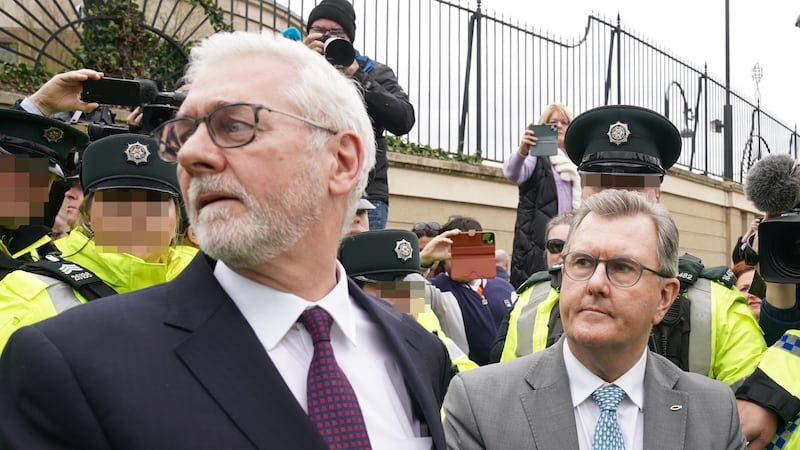A new deadline for the Northern Ireland political talks has been set by Secretary of State James Brokenshire.
Mr Brokenshire said an Executive had to be in place by the week commencing November 6 and if that deadline was not met he would be forced to set a budget.
Addressing the Northern Ireland Affairs Select Committee this morning, he said if no deal was evident by the week beginning October 30 he would need to begin the legislation process at Westminster to enable a budget to be set.
This means there would need to be a deal in place, or a clear indication there was a deal in the offing by Monday October 30.
"A breakthrough has not been reached. Whilst if I had given evidence to this committee last week, I might have indicated some momentum, some more positive progress, that momentum stalled at the end of last week," the secretary of state said.
He added: "The prospects do not look positive at this time."
SofS @JBrokenshire: If there is no Executive in place by w/c 6th November, if would be down to UK Government to set a budget.
— NIO (@NIOPressOffice) October 18, 2017
SofS @JBrokenshire: DUP & SF continue to engage. Issues that remain are few but highly sensitive, notably in relation to language & culture.
— NIO (@NIOPressOffice) October 18, 2017
Mr Brokenshire reiterated that the Irish Language act remained a sticking point in negoiations.
Taoiseach Leo Varadkar last night warned that the DUP and Sinn Féin were "not close to a deal", as former US President Bill Clinton had discussions with both party leaders in a visit to the north.
While he said he would let the parties "account for themselves as to what went wrong", he warned that "big things" including Brexit and challenges in the health service were not being dealt with because the former government partners were "arguing about the intricacies of an Irish Language Act".
SDLP leader Colum Eastwood said the two main parties had "brought us to the brink of direct rule" and it would be "a source of great anger" to nationalists that power and progress "is now being handed back to a Tory/DUP government in London".
“While crises engulf our health services and our schools, they have talked for month after month and have only delivered failure.
“In particular for the nationalist community, after years of trying to bring power back to Irish soil in order that local people could make local decisions, it should be a source of great anger that all of that power and progress is now being handed back to a Tory/DUP government in London.
“Talk of a slow ‘glide path’ towards more British government involvement in the north should fool no-one. A British government delivering a budget in Westminster is direct rule."
He said if no deal is reached the Dublin government must step in.
“In the absence of an Executive and Assembly, giving full and proper representation to those traditions falls on both the Irish and British governments,” he added.
Ulster Unionist Party leader Robin Swann said the north was "still being held to ransom by ideological demands".
"The public need to know whether there really is prospect of an Executive being formed by the DUP and Sinn Féin or if hopes are falsely being raised.
“If the two big parties cannot get their act together then the Secretary of State has a responsibility to look at other options to allow other parties to get on with the job.”
Alliance Health spokesperson Paula Bradshaw has accused the parties refusing to form an Executive of showing a callous disregard for patient care.
The South Belfast assembly member said that after "some hopes last week we are now hearing that the two main parties have still not agreed to form an Executive, despite the fact that they have proposals delivering consensus on their supposed key issues such as language and culture right in front of them".
She said Issues such as missed targets and long waiting lists affect quality of life "yet still we see parties putting their own narrow sectional interests ahead of the livelihood of hundreds of thousands of people".
“I agree entirely with the SDLP and others when they say there is now no reason not to form an Executive."

